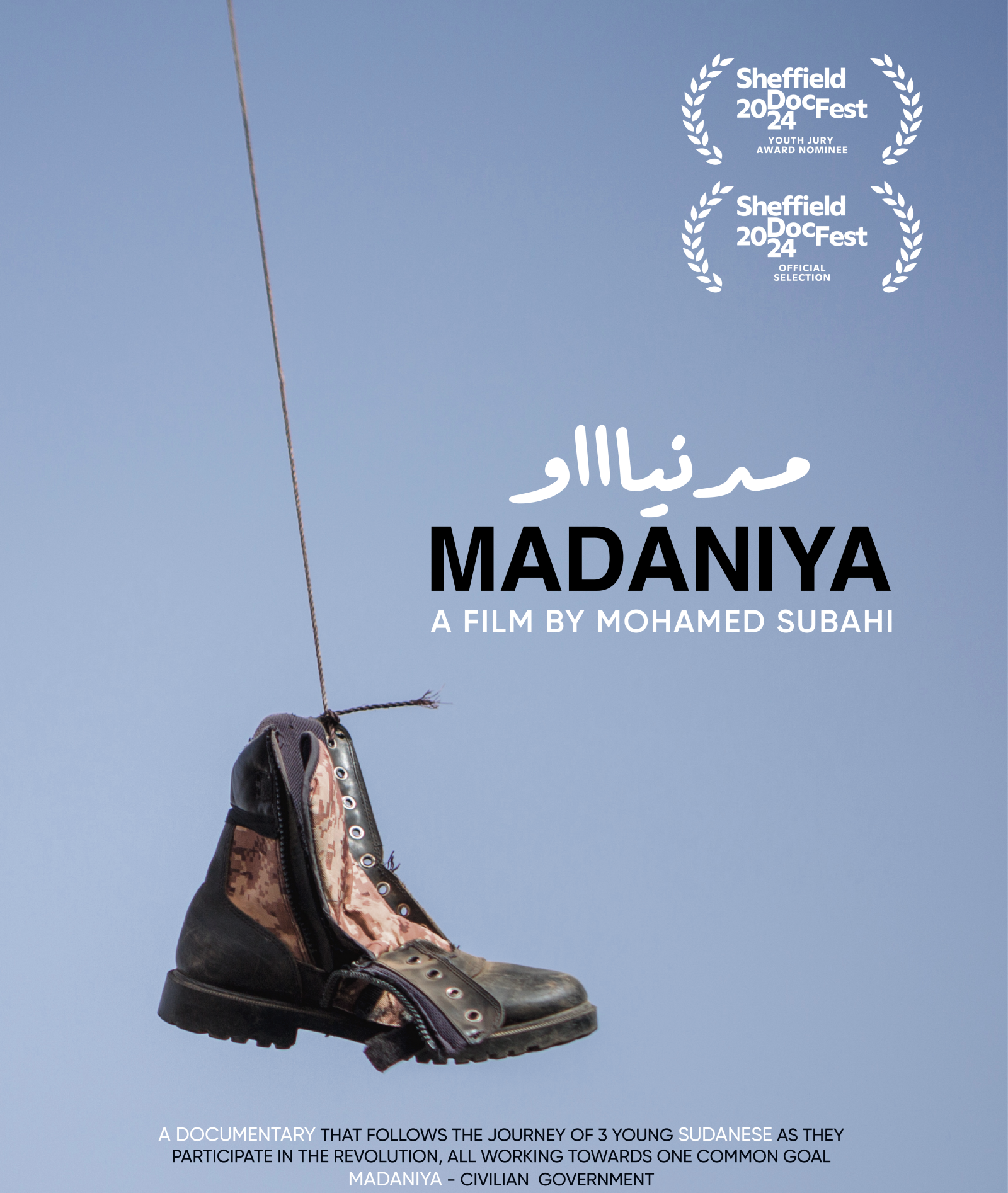
“No more Islamic rule. No more military rule,” reads the graffiti in the opening frames of Mohamed Subahi’s documentary Madiniya – ‘a civilian state’, the slogan of Sudan’s democratic movement in 2019.
In the next frame, a father, Django, irons his trousers and shirt as his young son and daughter look on. On the background television, history is being made as Abdullah Hamdouk is appointed transitional prime minister on 21 August 2019, in a power-sharing agreement between military and civilian groups.
“We can end the violence,” Django tells his children. “We can create a better and brighter future for our children.”
The documentary cuts to crowds on the streets, chanting and singing. “Freedom, peace, and justice. The people choose civilian rule.”
From movie-making to documentary-making
Madiniya centres around the stories of three ordinary people, everyday Sudanese who were the backbone of the 2019 uprising that led to the toppling of Omar Al-Bashir’s 30-year rule in Sudan in April 2019. They are all united by one dream: a civilian form of government for their country.
Among them is Django, a driver from a poor agricultural area outside Khartoum; Esra, a female painter and street artist; and Mou’men, a leather worker who distributes flyers and creates portraits on leather of those killed in the struggle for freedom.
Mohamed studied computer science, before attending a filmmaking workshop that changed his mission in life. It was periods based abroad that convinced him that he needed to educate more people about his country, given how little coverage Sudan gets in the international media.
In 2010, he co-founded the ‘Sudan Film Factory’, an artists’ organisation to work with young filmmakers and revive the Sudanese filming tradition, just as the country was on the brink of transformation. What started as a small workshop with 20 people evolved into a movement to document Sudan's fight for democracy.
Documenting the 2019 revolution
When the revolution began, Mohamed knew he had a job to do. “My job is as a filmmaker,” he says simply. "Doctors do their job. Engineers do their job. Cleaners do their job. I took my camera and decided to shoot.”
He explains that the sit-in protests in 2019 created an extraordinary community. Artists painted murals on walls, transforming Khartoum into a canvas of hope, as they coordinated with leaders of the movement. Mohamed documented it all.
“Everyone worked together,” he says. “People were united. They had an enthusiasm I couldn't have imagined. And it wasn't just in the capital Khartoum. This was movement across the country.”
The cost of truth
Documenting the revolution came at a price. “It wasn’t safe. I was arrested once, held for half a day. I came under fire, and Mou’em was shot when a sit-in was dispersed by security forces. I’d often film with my phone, or the protagonists used their phones, as it was too dangerous to carry a camera,” he says.
After the June Massacre in 2019, which saw a hundred protesters killed, Mohamed and his family fled the country for their safety.
He returned to Sudan several times to film additional footage, during the brief peaceful window when the army and government signed a deal for a three-year transition period, however the current civil war that broke out in April 2023 put an end to his filming.
“I had to save the material and save myself. Everyone knew me,” he explains. “I knew if I stayed, I would lose everything."
He fled with his footage to Germany via Ethiopia, connecting with Sudan Film Factory's network and supporters there. A local producer suggested he should turn his raw footage into a movie.
Against All Odds
The resulting documentary Madiniya has screened at film festivals around the world: in Sheffield, Cairo, Poznan, Jerusalem, Abu Dhabi, and Istanbul. It was thanks to a grant from EED, that Mohamed was able to finalise his documentary film, and organise screenings.
For Mohamed, festival recognition isn't the ultimate goal. "People tell me they’ve never seen a film like this before,” he says. “They’ve learned more about Sudan through my film. That's what matters to me. Today, as a vicious civil war continues in Sudan for over two years, there's virtually no media attention. We have a beautiful country, and the international community needs to know what's happening.”
The Mission Continues
Today, Mohamed is working on new projects focused on art and culture, conducting surveys with artists who live in Nairobi and documenting the war's impact on Sudan's creative community. He dreams of creating a website with music—something like Verzuz, but for Sudan.
When asked about what motivates him, Mohamed mentions the constant struggles for democracy in his country.
“I grew up in this struggle,” he says. “I fought for many years. I was tired, but I still wanted to change things. I wanted to work with the people fighting for change. It took us four months to bring down Bashir."
He explains that for him filmmaking isn't just about documenting history: it’s about ensuring that the sacrifices made during Sudan's revolution aren't forgotten.
"We're not just making movies," he says. “We're preserving the memory of those who fought, who died, who sacrificed everything for Sudan's future. That's my job as a filmmaker, to make sure the world doesn't look away."
This article reflects the views of the grantees featured and does not necessarily represent the official opinion of the EED.